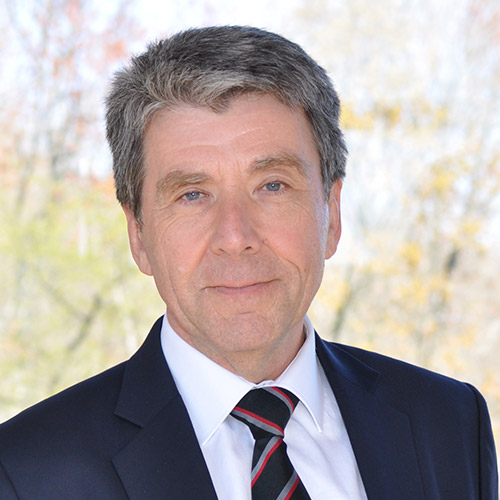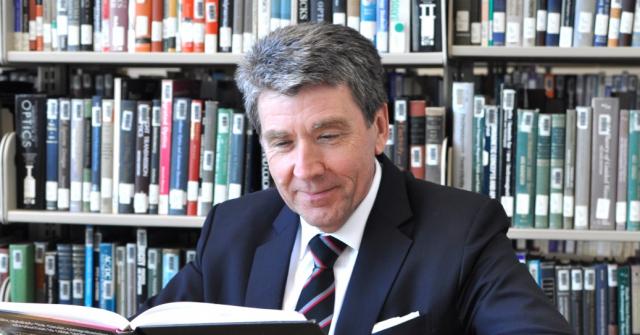Interview: Dr. Ian McAndrew, Dean of Doctoral Programs
November 1, 2018Since joining Capitol Technology University in 2018, Dr. Ian McAndrew has guided the launch of new doctoral programs at the university while further strengthening Capitol’s existing programs in cybersecurity and business analytics. An engineer by training, Dr. McAndrew worked in industry before transitioning to academia, where he has pursued his passion for research while mentoring students in engineering and technology fields. Dr. McAndrew has served as chair for more than successful 35 dissertations and has published 60 papers in engineering journals and conferences. He has five degrees, a PhD, two master’s degrees and two bachelor’s degrees; he is also a Fellow of the Royal Aeronautical Society and recognized as an international leader in aerodynamics research. He chairs several international conferences and journals and is invited to give keynote speeches all over the world.
Could you tell us a little about yourself?
I have a classic mechanical engineering background, but am also a professionally qualified electrical engineer. I started working in the automotive industry as a mechanical engineer, focused mainly on the thermodynamics of car engines. I then went to work in the university sector in the United Kingdom, and started running the thermodynamics and aerodynamics laboratories at the University of Hertfordshire, in addition to teaching at the undergraduate and graduate levels and supervising PhDs. Subsequently, I began working for Embry-Riddle, where I ran the graduate department, co-ordinated PhDs across the different university campuses, and served as associate dean of research for the college of aeronautics. In 2018, I took up a new role at Capitol Technology University and am excited about being part of Capitol’s ongoing growth and transformation.
What are your main research and academic interests currently?
Thermofluid mechanics is my main area of interest – particularly heat transfer and fluid flow. By accident more than planning, I’ve become a world expert on low-speed aerodynamics. There was a clear niche there, a lack of knowledge concerning low-speed flight. It is an area that has not received much attention since the First World War, as by then planes were going fast enough not to be considered as low-speed.
What do you see, in general, as the value of a doctoral degree?
We can answer this question from the perspective of the university, as well as from that of the student. From the university’s perspective, having a doctoral program means that we get to work with people who are at the leading edge, undertaking new research and advancing knowledge in the field. If a university is not involved with research, then it becomes simply a reproducer of existing knowledge – books other people have written. Students study and take careful notes regarding things that other people have already done.
From the student’s perspective, a doctoral degree is the icing on the cake in terms of personal achievement. Not everyone is capable of completing a doctorate. It is achieved through a combination of intelligence, hard work, and persistence – not giving up. The most rewarding thing is for a student to walk into a room to defend their work, and then come out with the title “doctor.” It is a journey that takes you from being a professionally qualified person to someone who is at the leading edge of knowledge in their area. At Capitol, for instance, we are producing doctoral graduates who are working at the forefront of STEM research, whether it’s in cybersecurity, business analytics, unmanned systems, or other areas.
Under your guidance, Capitol is offering new, European-model doctoral degrees that are flexible in terms of disciplinary focus, and also get the student involved right away in dissertation research (with less emphasis on traditional coursework). What are the benefits of this type of degree and what kinds of students are the best fit for this degree?
The American approach to doctoral study differs from the European one. Is one better than the other? No. Each is better-focused in certain areas. Take cybersecurity, for example. If you did doctoral work in cybersecurity using the European model, you would look closely at one particular part of the cybersecurity field. You would not cover a broader range. Our DSc students, when they complete their degrees, have had the chance to study key aspects of cybersecurity as a whole – the whole range of issues that drive the field at the moment. They graduate with a lot of knowledge across quite a few different areas, combined with deeper knowledge in their specific area of focus.
There are limitations to this approach, however. If you are in industry – and we have a senior Boeing executive who is doing a PhD in Technology at the moment – you will likely be interested in the use of technology to assist complex manufacturing processes: for instance, how Google Glass could be used to make sure complicated wiring looms are manufactured without fault. You’re focused on an actual industrial problem. You do not have the time to learn lots of other things, no matter how interesting they may be. You want to solve a particular problem. In addition, work and family commitments may make it difficult to keep up with synchronous classroom learning, where you have to be available for the lecture at a given time. Time zones complicate things further – a schedule based on Eastern Standard Time is not necessarily going to work for a student in California.
By offering a research-focused, European-style model, we can give students the flexibility they need – to work hard on their doctorate during the weekend, for instance, while committing to their job during the week. They can find pockets of time to get things done. If they have to travel somewhere on business, they don’t have to worry about missing a class.
A doctoral degree is a formidable undertaking – one that many students approach with trepidation. In your experience, what are the keys to success?
The keys to success depend on us, during the admissions process. Are we recognizing people who are capable of doing a doctoral degree? We do not want to just let someone start, pay the money, and see how they get on. When we make an offer of acceptance, it is because the evidence is there that you are intelligent and capable enough to undertake such a program, and that we have no doubt you can succeed.
Of course, success does not come automatically. It takes time and commitment. There are life problems that can get in the way and slow their progress. Nevertheless, there isn’t a single doctoral student in our programs who is not capable of completing the journey. I tell students that we are prepared to work with them to accommodate their situations, should problems come up.
What do you find most exciting about Capitol Technology University?
We are at the start of a long road – although Capitol has a rich history, it is only recently that we became a university, and we are growing. That’s an exciting place to be. We’re headed in the right direction and we have an excellent team that is committed to moving us forward. While on campus, I am always struck by the enthusiasm of people – administrators, faculty, staff, and students. Whenever I have had a question or needed assistance with something, people were ready to help. There is a willingness to step up to the plate that you don’t always encounter at other institutions. It is exciting to work among people who are committed to the university’s mission and its future.
You have been active as a presenter and participant in conferences around the world. What are some of the topics you have focused on at these events?
I am invited to about twelve conferences annually as a conference chair or keynote speaker; my most recent have been in China and Berlin. It is partly a result of my longevity as a researcher in my field; I like to think it also reflects the quality of the research I have been doing, and my commitment to research generally. Many of these conferences are attended by junior faculty, post-grads, PhD students, and by scientists and researchers seeking to disseminate their information, so there are opportunities for mentorship. I believe that is very important. If any of us have been successful in life, it is because we have been mentored. Working with the next generation as they come through conferences is important.
Meanwhile, from the university perspective, it is a great way for us to wave our banner and achieve brand recognition internationally. Capitol is becoming a university with a global outlook and global reach, and being represented at conferences worldwide helps get the word out. The conferences I chair are very well-aligned with the doctoral programs that we offer, and we want people with similar areas of academic focus to know we are here.




